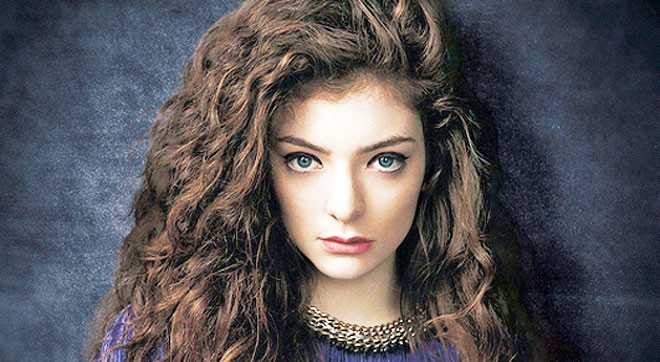

The problem with the precocious 16 years old, New Zealander, Lorde (real name Ella Yelich-O’Connor) is best demonstrated in a cover song she does of my favourite band The Replacements (only available on the extended version of her acclaimed debut album Pure Heroine). As is typical of most Replacements fans, I would normally love anyone who was even aware of the fabulous Replacements. Yet, Lorde turns the band’s classic ballad ‘Swinging Party’ (a song about a misfit who does not fit in but still goes and gatecrashes a party) into a song about a misfit who does not really go to the party because she is just too cool or grownup for it. Both protagonists are losers in two distinctly different ways: I would not want to hang with the latter (and neither would she want to hang with me), while I may well myself be the former. This is where Lorde loses me for all her brilliance and acclaim. The Replacements spoke for and of losers who were losers because they had nothing more to lose; Lorde represents those who lose out because they act too cool to care but still have a lot of say because perhaps, deep down they care.
Pure Heroine, Lorde’s debut album is a masterwork to many (Dave Grohl for one); I can certainly see its merits but I just do not like the downer vibe it puts forth. Had Lorde dropped the last vowel from the album title, it would have been quite apt as it successfully attempts to put the listener under a narcotic haze. There are no uplifting, explosive choruses on the album and while the album is melodic and interesting, it is also mostly understated by choice. I may even concede that the problem lies perhaps with me: I have never seen the point of heroin or why anyone would want to take a downer. But then again, millions of people across the globe do and in fact crave them. Pure Heroine I suspect is aimed at them.
The saving grace of the album is its hauntingly spare music and its emphasis on melody on each track, especially on the vocals. Lorde is vocally versatile, at times breathy and at others downcast. She ranges from throaty to seductive and is miles better and more talented than the present-day prepackaged flavours of the month.
The biggest song on the album is the anti-bling ‘Royals’, a Grammy winning, almost-anthem, "Song of the Year". It is catchy, has Beatlesque harmonies to complement spare instrumentation (thudding kick drum, finger snaps and wobbly synth bass). The rest of the album is mostly more of the same.
For my money, the best track on the album is the album-ending ‘No Better’. In it even Lorde relents and ends the album on a more uplifting note with memorable stream of consciousness vocal lines and an equally memorable chorus. The album opener ‘Tennis Court’, had it not been for the awkward lyrics, is quite brilliant too. Most other tracks are good (’400 Lux’ with its trippy beat and insistent synths; the almost mainstream pop of ‘White Teeth Teens’) verging on very good (the almost dancey in places ‘A World Alone’). Yet they all remain unmemorable in that you could not really tell one track from the other.
Interestingly, all tracks on the album are co-written or solely written not by Lorde but by her producer Joel Little. The hidden star on the album is in fact Little. The liner notes list him as "Composer, Engineer, Instrumentation, Mixing, Producer." One wonders how much of a song is Little’s and how much is it Lorde’s. One also wonders will she too flounder after a strong beginning like Alanis did without Glen Ballard or to a lesser extent Sheryl Crow did without Bill Bottrell.
In view of her age, one at times feels that a lot of what Lorde has to say even when intelligent is derivative or juvenile. You can see her Sylvia Plath influence in the lyrics but she lacks Plath’s maturity or brutally naked insight. Some of Lorde’s lines do not make sense and are just too awkward e.g. ‘I have never seen a diamond in the flesh’ (Do diamonds have flesh?) She is more Sylvia in high school than the late-life fevered Sylvia Plath of Ariel. Lorde is literate (her mother is a famous poet), and lyrically verbose to the extent of seeming pretentious. Music such as Lorde’s works better with spare evocative lyrics (Massive Attack, The xx). Lorde however is like the Arctic Monkeys, a band who are also critical darlings but suffer from verbal diarrhea. Lorde just says too much and with way too much all-knowing confidence; ‘Don’t you think that it’s boring how people talk’ is the first line of the album and then she proceeds to talk your ears off all the way through the album.
One wonders how long Lorde will nag, and more than that, how long can we stand a nag. When she came on the scene Lorde herself started by criticizing Taylor Swift publicly and now claims Swift to be artistically valid and a good friend. She still hates Selena Gomez though.
Teenagers at the end of the day are allowed to change their mind and be less manic. One just hopes Ms. Lorde changes into something less grim and joyous. For the present this is an impressive album that should be listened to in moderation, lest a down vibe is what you are looking for.